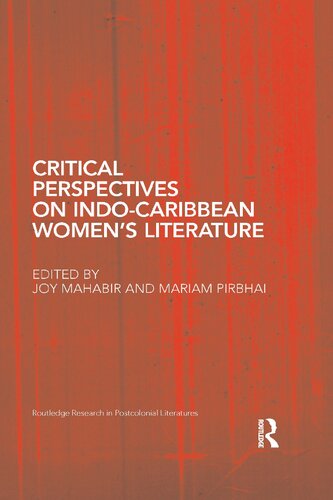

Most ebook files are in PDF format, so you can easily read them using various software such as Foxit Reader or directly on the Google Chrome browser.
Some ebook files are released by publishers in other formats such as .awz, .mobi, .epub, .fb2, etc. You may need to install specific software to read these formats on mobile/PC, such as Calibre.
Please read the tutorial at this link: https://ebookbell.com/faq
We offer FREE conversion to the popular formats you request; however, this may take some time. Therefore, right after payment, please email us, and we will try to provide the service as quickly as possible.
For some exceptional file formats or broken links (if any), please refrain from opening any disputes. Instead, email us first, and we will try to assist within a maximum of 6 hours.
EbookBell Team

5.0
18 reviewsThis book is the first collection on Indo-Caribbean women's writing and the first work to offer a sustained analysis of the literature from a range of theoretical and critical perspectives, such as ecocriticism, feminist, queer, post-colonial and Caribbean cultural theories. The essays not only lay the framework of an emerging and growing field, but also critically situate internationally acclaimed writers such as Shani Mootoo, Lakshmi Persaud and Ramabai Espinet within this emerging tradition. Indo-Caribbean women writers provide a fresh new perspective in Caribbean literature, be it in their unique representations of plantation history, anti-colonial movements, diasporic identities, feminisms, ethnicity and race, or contemporary Caribbean societies and culture. The book offers a theoretical reading of the poetics, politics and cultural traditions that inform Indo-Caribbean women's writing, arguing that while women writers work with and through postcolonial and Caribbean cultural theories, they also respond to a distinctive set of influences and realities specific to their positioning within the Indo-Caribbean community and the wider national, regional and global imaginary. Contributors visit the overlap between national and transnational engagements in Indo-Caribbean women's literature, considering the writers' response to local or nationally specific contexts, and the writers' response to the diasporic and transnational modalities of Caribbean and Indo-Caribbean communities.